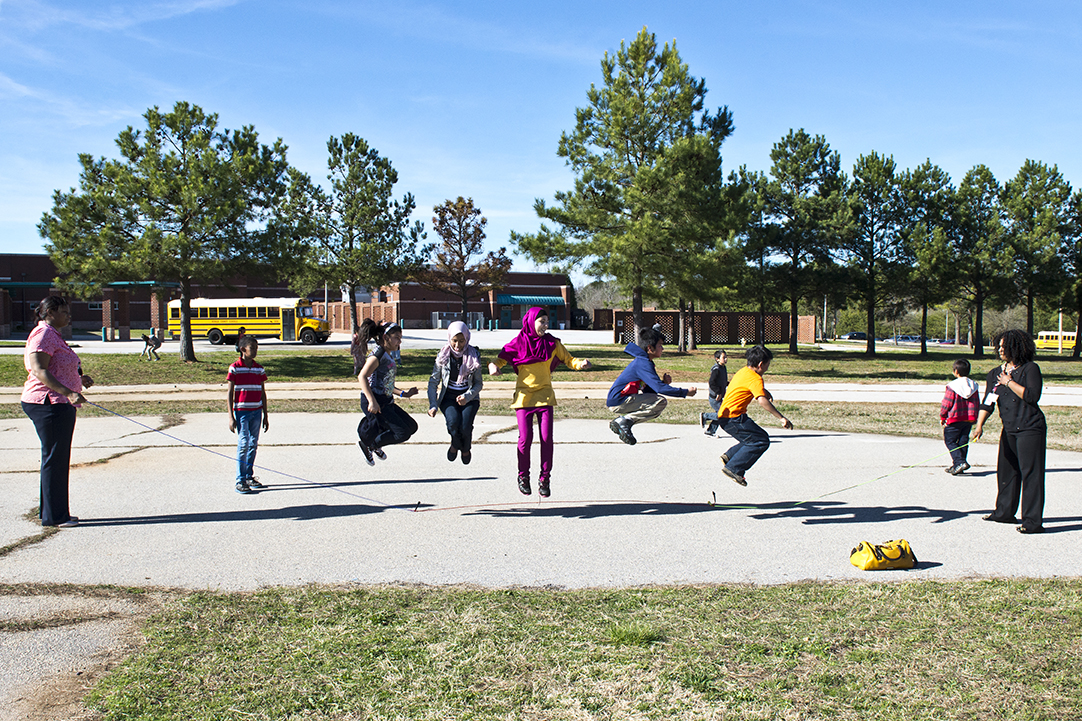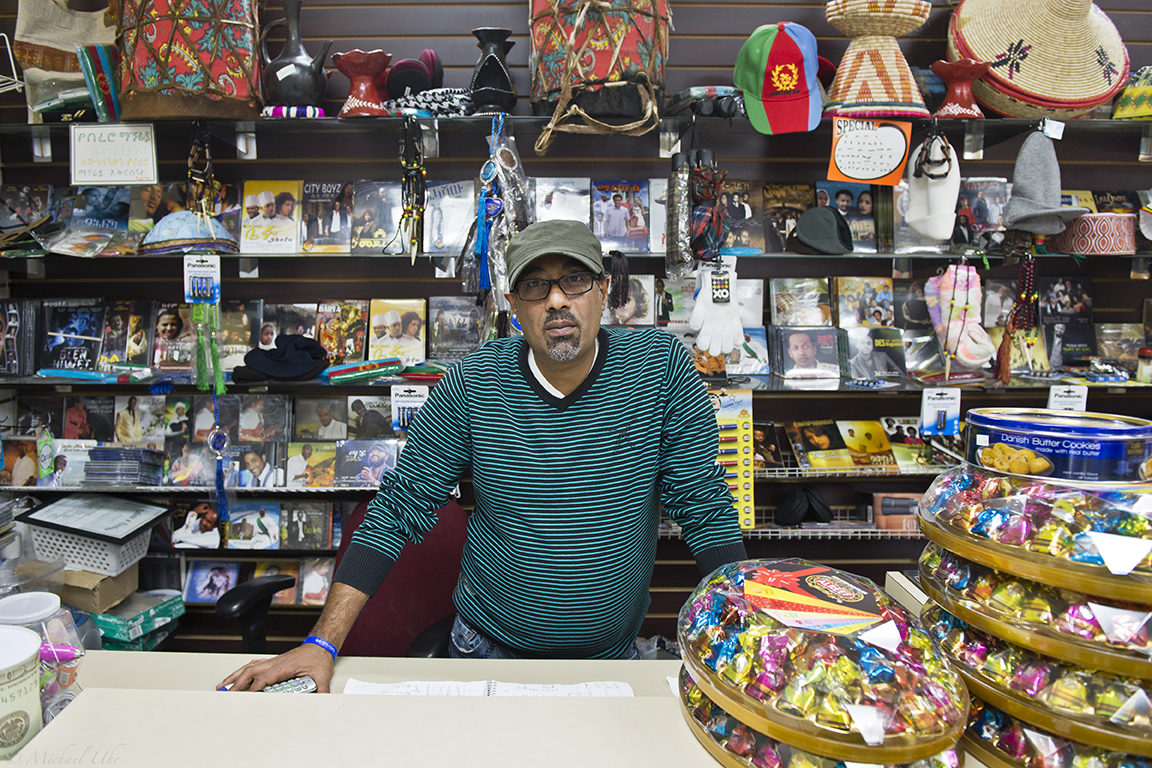clarkston (n.)
Students in New American Pathways’ Bright Futures after-school program skip rope with their teachers during physical activity time, Stone Mountain, Georgia [photo: Michael Uhr; courtesy of the artist and Centers for Disease Control]
Share:
Country: United States of America / State: Georgia / County: Dekalb / Population: 7791 (as of 2013, according to city-data.com) / Motto: “Where possibilities grow”
Clarkston, Georgia, is a small suburb of Atlanta, and has the highest refugee resettlement rates in the area.
Metropolitan Atlanta’s highway system, affordable housing market and key industries, such as food processing and manufacturing, suit it for successful refugee integration. In the late 1980s and early 90s, refugee resettlement agencies chose Clarkston as a home for new arrivals from around the world. The town had a surplus of cheap apartments, access to public transportation, and was close enough to the bustling economic engine of Atlanta to offer the prospect of jobs for newcomers.
The first arrivals were from Southeast Asia. Soon, refugees arrived from the conflicts in the Balkans, and later, from Africa and the Middle East, radically changing the makeup of a simple southern town. In the peak years from 1996 and 2001, nearly 20,000 refugees were sent to Georgia, with most settling in Clarkston or the surrounding areas.
Students in New American Pathways’ Bright Futures after-school program skip rope with their teachers during physical activity time, Stone Mountain, Georgia [photo: Michael Uhr; courtesy of the artist and Centers for Disease Control]
- Clarkston, History of
Clarkston was settled by white railroad workers and farmers in the late-1800s. It remained rural and mostly white until the 1970s, when developers began to build apartment complexes for middle-class workers drawn to Atlanta after the international airport opened. Over the next decade, many of those workers began to move to newer suburbs. Vacancies increased, and home prices fell. Multi-national diversity came to Clarkston.
In the 1990s, aid agencies contracting with the federal government to resettle refugees identified Clarkston as the perfect place for these vulnerable newcomers. As refugees have adapted to life in Metropolitan Atlanta, they have often moved out of Clarkston to other cities, including Norcross, Tucker and Duluth. With residents coming from over 50 countries, Clarkston remains one of the most diverse communities in the United States.
Since 2007, the U.S. has increased resettlement of Arabic-speaking refugees, fleeing conflict in the Gulf Region. Over 1,000 of these individuals have been resettled in Clarkston; a majority are female survivors of torture and trauma. As the flow of refugees and need for aid has increased, government funding for programs supporting mental health, resettlement, and extended cultural orientation has declined. Community-based organizations have formed to provide vital stopgap services. This phenomenon has ostensibly coincided with a rise of xenophobic and anti-Islamic sentiment in America, impacting both the wellbeing of and the creation of opportunities for marginalized refugee populations.
Clarkston is a place of great religious diversity, and is home to Buddhist, Christian, Hindu, and Muslim congregations, among many other faiths. Religious groups have provided resources and community for refugees from their immediate communities, and for others. The Somali American Community Association operates a free, inter-faith afterschool program at Clarkston First Baptist Church that serves refugee and non-refugee children. Initiatives such as the Clarkston Interfaith Group actively work to create community between religious groups, for example by hosting meetings, interfaith children’s activities, and in this case, an annual interfaith immersion weekend.
- Clarkston Community Center
The Clarkston Community Center (CCC) is a gathering place for cultural celebrations, art, education, and recreation. It aspires to serve Clarkston’s children, youths, adults, and elderly, regardless of their citizenship or immigration status, through such activities as an afterschool program, English language instruction and GED programs, and a weekly farmer’s market. It also hosts activities organized by outside groups, including a martial arts program, a football (soccer) club that also functions as an education support group for high school-age youths, and weekly contra dances that attract people from around metro Atlanta. National and ethnic groups conduct meetings and celebrate holidays at the CCC, and most efforts to engage the Clarkston community in discussion of an issue, idea, or development, take place there. Despite this great diversity of activity, and efforts to bring together refugee and non-refugee populations through a range of programming, the CCC is perceived by many as a place “primarily for refugees.”
The CCC supports the preservation and sharing of traditional and folk culture among Clarkston’s many refugee groups. Eid (the end of the Muslim observance of Ramadan), Chin Burmese National Day, Ethiopian New Year, Diwali (South Asian festival of lights), American Thanksgiving, and Teej (the Bhutanese and Nepali women’s festival) are celebrated there.
- Clarkston Village
The Clarkston Village shopping center, anchored by the Thriftown grocery store, is emblematic of Clarkston’s transformation.
Clarkston Village is a shopping center that was originally built in the 1960s. It has been anchored by the Thiftown grocery store since the 1980s, and has enthusiastically embraced the area’s multicultural refugee population. Thiftown goes far to accommodate the needs and tastes of Clarkston’s diverse customer base; this is reflected in the goods it stocks, the people it employs, and the staff’s attitude toward its customers. Clarkston Village also hosts a variety of businesses operated by and serving refugee communities: Bhutanese, Eritrean, and Ethiopian restaurants; Bhutanese and Burmese specialty stores; and a pharmacy that accommodates low-income and non-English speaking patrons.
Although Clarkston Village is a welcoming and exemplary commercial model, the City of Clarkston has sought to change its character, aggressively enforcing code, and encouraging a replacement of current businesses with national chains catering to a Western middle class. Clarkston Village’s restaurants nonetheless attract diners from throughout Clarkston and the entire metro Atlanta area.
- Clarkston, Coffee Klatch of
In response to the emotional trauma associated with displacement, migration, and prejudice experienced by refugees from the Middle East, 50 Cents. Period.—a Georgia-based non-profit organization—created the “Coffee Klatch” program to provide social support and linkages to culturally sensitive medical and mental healthcare. Coffee Klatch provides a platform for informal, participatory, psychosocial surveys and activities, where feedback is solicited from participants. The program has thus grown to include access to and help with mobile technology, increased the number of local female medical providers, and create regular Arab cultural activities in their community.
Participants are enrolled in primary health care, and have received recommended NIH screenings. They have also created their own trauma support group, and within less than a year from its formation, begun to report an increased sense of wellbeing. Coffee Klatsch is now the measure for local “best practice,” and has been adapted for use in non-Arab speaking communities, by resettlement and social service agencies serving Southeast Asian and East/Central African refugee women.
Hussein Galib, owner of Dalmar Market, a Clarkston store specializing in Ethiopian foods and goods [photo: Michael Uhr; courtesy of the artist and Centers for Disease Control]
- Clarkston, Ethnic Community-Based Organizations (ECBOs) of
Some refugee communities find their religious institutions to be the best source of support; others form ethnic community-based organizations (ECBOs) to address culturally specific needs. ECBOs are run by and for a particular refugee community, so their staff have similar backgrounds to those of the people they serve, and thus play a crucial role in supporting refugees in their individualized paths to self-sufficiency, through services such as language classes, afterschool programs, emergency financial support, cultural gatherings, and citizenship classes. ECBO leaders often also serve as essential civic and political representatives for and among refugee communities, advocating for opportunity, recognition, and political agency.
Clarkston’s ECBOs have historically reflected the various waves of nationalities and ethnicities that have come to the area since the 1980s; today, ECBOs serve Chin (Myanmar) and Darfurian (Sudan) peoples, for example, and are budding among Syrian, Congolese, and Iranian communities.
- Clarkston, Sagal Radio Services of
Founded in 1998, Sagal Radio Services provides the Clarkston area with online and on-air programming in six languages: Somali, Swahili, Amharic, Bhutanese, Kareni, and English. Its radio hosts and staff are volunteers who reflect the linguistic and cultural diversity of Clarkston and metro Atlanta’s refugee, immigrant, and American communities. Sagal Radio is self-described as “The Voice of New Americans,” and aims to build a strong community through civic education and engagement. In addition to weekly notices about local events and community meetings, its programming has provided tools for access to health services, school enrollment for children, finance advice, and applications for citizenship.
- Clarkston, Somalian Bantu Community of
The Somali Bantu are an ethnic minority group. Two centuries ago, the Bantu were taken from the shores of Mozambique, Malawi, and Tanzania, and carried on Arab slave ships to Somalia. The Bantu were freed from slavery at the turn of the 20th century, but continued to be denied political representation and rights to land ownership. During the Somali civil war, as a visible ethnic minority, they were disproportionately victims of rapes and killings; refugees scattered to camps in neighboring countries such as Kenya. When the U.S. State Department took on 12,000 Bantu refugees for prioritized resettlement in 2002, metropolitan Atlanta was one of the top destinations.
Over 40 percent of all people in Somalia rely on remittances from family abroad to meet their basic daily needs. In order to send money back home, refugees generally rely on specialized money transfer agencies, which operate in Clarkston and elsewhere, working with small and medium-sized U.S. banks to remit funds. In recent years, stricter anti-terrorism regulations have hampered the flow of money to countries such as Somalia, making it harder for refugees to provide household support to their relatives.
Research for this entry is provided by the David J. Sencer CDC Museum at the Centers for Disease Control in Atlanta, and adapted from exhibition materials presented as part of Resettling in America: Georgia’s Refugee Communities (July 13 – December 31, 2015), curated by Kali-Ahset Amen and ART PAPERS board member Louise E. Shaw.

